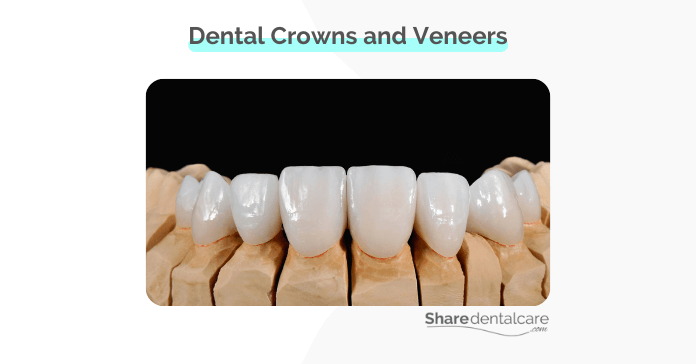Dental crowns and veneers are used to fill gaps between teeth or cover teeth that have been damaged by decay or trauma. Crowns cover the entire visible part of a tooth, while a dental veneer is just applied to the front surface of the tooth. They’re usually made from porcelain, which is strong, durable, stain-resistance, and can match the natural color of teeth. In this blog post, we’ll discuss do porcelain crowns and veneers stain and can teeth whitening helps lighten their color.
Do Porcelain Crowns & Veneers Stain?
Before we discuss whether teeth whiting is effective for crowns and veneers, let’s first take a look at what dental porcelain is. Porcelain is a very strong material, which is why it’s often used to make dental crowns and veneers for teeth. Not only is porcelain strong and durable, but it’s one of the few materials that can mimic the natural color of teeth. It is also stain-resistance, which means it doesn’t typically discolor or turn yellow over time. However, porcelain crowns and veneers over time can become damaged if they’re not cared for correctly, which can lead to minor staining. Porcelain crowns can be damaged by:
- Teeth grinding or teeth clenching.
- Biting and chewing hard objects such as fingernails or ice.
- An improper bite can chip the porcelain crown.
- The use of highly abrasive toothpaste.
- Trauma such as a fall or sports injury.
Smoking, coffee drinking, and other factors can cause teeth stains that can be removed with teeth whitening, but these factors won’t affect porcelain crowns and veneers. Porcelain is stain-resistant and doesn’t typically discolor or turn yellow over time. However, porcelain damage can cause minor stains that can be easily removed with porcelain polishing and professional teeth cleaning at your dentist’s office.

Can Teeth Whitening Lighten the Color of Porcelain Crowns & Veneers?
No, teeth whitening will not lighten the color of porcelain crowns and veneers. This is because teeth whitening is only effective at removing stains from teeth enamel, which is not the same as porcelain. If your crowns or veneers have minor stains due to porcelain damage, visit your dentist to have them professionally polished or replace them if they are too damaged. Read more about repairing a chipped crown with exposed metal.
Can Teeth Whitening Lighten Composite Veneers?
A veneer is a thin shell of porcelain or composite resin. It is bonded to the front surface of a tooth to change its appearance and correct misaligned or crooked teeth, chipped or cracked teeth, worn enamel, and other dental imperfections.
The veneers are made from materials such as porcelain or composite resin. Porcelain is a popular choice because it is strong and resists staining. Composite resin is less expensive and can be matched to the color of your teeth. Composite resin can discolor over time due to several reasons, such as coffee, tea, and smoking. Simply, you can’t white composite veneers or dental crowns with teeth whitening products. To whiten composite veneers, you have to visit your dentist to replace them or get porcelain veneers.

My Crowns / Veneers Appear Darker After Teeth Whiting, Why is This?
Teeth whitening removes stains from the tooth enamel and makes your teeth appear lighter. Dental crowns and veneers don’t respond to teeth whitening products and will not change in color, which will make them appear darker in comparison to your newly whitened teeth. So, it is recommended to stop whitening when you begin to notice this difference and maintain the color of your teeth at this point. If you need a whiter color, you may want to consider replacing your dental veneers or crowns with new ones.
Conclusion
Porcelain is strong, durable, and stain-resistant material that is used to make dental crowns and veneers. It doesn’t typically discolor or turn yellow over time. Sometimes, porcelain damage can cause minor stains that can be easily removed with porcelain polishing and professional teeth cleaning at your dentist’s office. Dental crowns and veneers don’t respond to teeth whitening products. Teeth whitening is only effective at removing stains from teeth enamel, which is not the same as porcelain or composite resin.